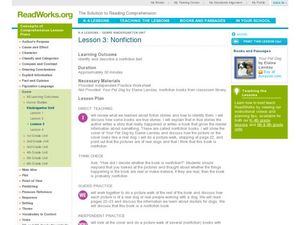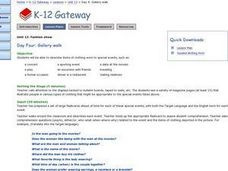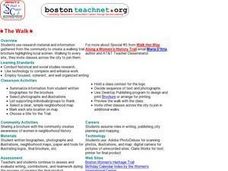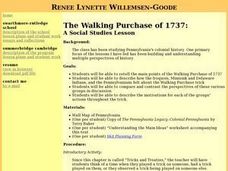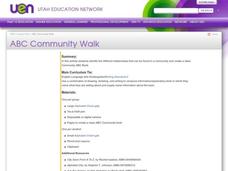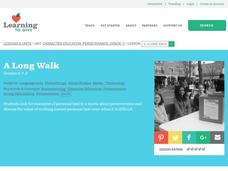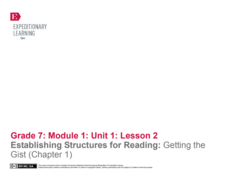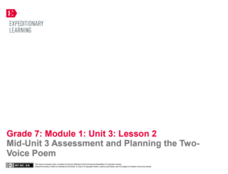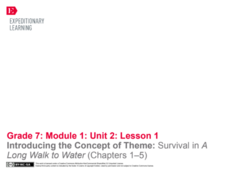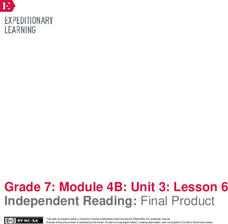Curated OER
Lesson 3: Nonfiction
Introduce young readers to the word of non-fiction. They examine the features found in non-fiction books such as, facts, dates, and realistic pictures. They discuss how the images in the book Your Pet Dog depict real dogs...
Curated OER
Unit 13: Fashion Show - Day Four: Gallery Walk
Students practice the vocabulary associated with clothing that is worn to special events. In this clothing vocabulary lesson, students, who are ESL learners, practice using works that describe clothing items that are worn for a concert,...
Curated OER
A Walk Through the 20th Century
Students use primary and secondary sources to study the literature, historical events, people, technology, medicine, government, entertainment and culture of the decades of the twentieth century.
Curated OER
The Walk
Students gather information from the local community about a walking trail. They create a brochure highlighting the women from the community. They walk to every site in which women made an impact.
Curated OER
The Walking Purchase of 1737
Students review the main points of the Walking Purchase of 1737. In groups, they describe how the Iroquois, Minisink, and Delaware Indians felt about the purchase and compare and contrast the different views. They write and perform a...
Curated OER
ABC Community Walk
Students listen to several stories about cities and different types of communities. They take a walk in their city to identify unique characteristics. They create an alphabet book using people or features of their own community to go...
Curated OER
A Long Walk
Seventh graders identify ways people persevere in a difficult situation. In this character education lesson, 7th graders watch a video about a man with cerebral palsy and discuss ways he perseveres.
EngageNY
Building Background Knowledge: Introducing Pygmalion
Learners take a gallery walk around the room to view images and text of Victorian England culture and then complete a Predictions Walk note-catcher as they circulate and take turns reading quotation strips from Pygmalion. Class...
EngageNY
Building Background Knowledge: The Boy Who Invented TV, “Life before Philo”
Walk through the pictures to understand the text. Scholars analyze The Boy Who Invented TV: The Story of
Philo Farnsworth by taking a book walk and looking at the pictures. They then do a first read of Life before Philo to...
EngageNY
Introducing Historical Context: Narrative of the Life of Frederick Douglass
Is it possible to judge a book by its cover? Scholars analyze and make predictions using various cover images of Narrative of the Life of Frederick Douglass. They then discuss the difference between autobiographies and biographies....
Curated OER
Crocodiles Escape in Vietnam
What, there was a crocodile escape? Read, analyze, and examine a newspaper article with your class about the crocodiles that escaped in Vietnam. Your English language learners note the facts and key vocabulary in the story and answer...
Curated OER
What is Proofreading?
Is your essay coherent? Does it make sense? Is it formatted correctly? Does it adhere to standard English conventions? This helpful and informative slide-show walks learners step by step through the editing and proofreading process. Each...
Curated OER
Growing from Seed
High school or college horticulturists will appreciate this PowerPoint on seed-propagation. It walks them through the science behind seed production and germination as well as the requirements for growing plants from this stage....
Literacy Design Collaborative
Irony in Short Stories
Scholars read three texts and analyze the dialogue of the characters to find examples of humor and irony that contribute to their characterization. They then walk through the writing process to create a final essay.
EngageNY
Establishing Structures for Reading: Getting the Gist (Chapter 1)
Class members review expectations for successful discussions before reading chapter one of A Long Walk to Water by Linda Sue Park. They engage in a think-pair-share to discuss the gist of the text and add their thoughts to their Readers'...
EngageNY
Practicing Structures for Reading: Gathering and Using Evidence to Analyze Salva’s and Nya’s Points of View (Chapter 4)
Class members discuss the gist of chapter four of A Long Walk to Water by Linda Sue Park with a partner and share their responses with the class. Next, they complete graphic organizers to answer text-dependent questions based on a close...
EngageNY
Mid-Unit 3 Assessment and Planning the TwoVoice Poem
Class members prepare to write a two-voice poem that compares and contrasts two characters from Linda Sue Park's novel, A Long Walk to Water. Pupils also complete the mid-unit assessment, answering questions about juxtaposition from...
EngageNY
Launching the Performance Task: Planning the Two-Voice Poem
Two voices, one poem. Scholars learn about and write a two-voice poem using graphic organizers, model poems, and guides. They practice reading poems with a partner and discuss how a poem of this type could help compare Salva and Nya...
EngageNY
Independent Reading: Final Product
Cheater, cheater. Learners create cheat sheets about their independent reading books to help others determine if the text interests them. After creating drafts of their sheets, scholars pair up for a peer review and then complete a final...
EngageNY
Interviewing Meg Lowman: What Does it Mean to be a Responsible Scientist? (Pages 37–39)
Can I ask you something? Scholars read about the night walk on pages 37-39 of The Most Beautiful Roof in the World. After discussing the text with their group, they work together to create interview questions they would ask Meg...
EngageNY
Introducing Promises to Keep and Drawing Inferences: Who Is Jackie Robinson and Why Is He Important? (Promises to Keep, Pages 6–7)
Scholars take a picture walk through the book Promises to Keep: How Jackie Robinson Changed America. They make predictions and complete a Notice/Wonder/Inference note catcher. They then define and analyze words on pages six and...
Curated OER
Gender Opinions Using Adjectives
Activate personal experience and opinions with this graphic organizer. Learners response to 8 questions about gender and then record responses from classmates. This activity could be set up as a give-one/get-one and class members could...
Curated OER
The Star-Spangled Banner
Get your kids moving as they learn about the history of the United States National Anthem. Scholars examine the War of 1812, Francis Scott Key, and the meaning behind The Star Spangled Banner as they listen to an 18-minute...
Shmoop
ELA.CCSS.ELA-Literacy.W.9-10.9
Encourage your pupils to support their claims with textual evidence, whether is is from literary texts or informational texts. You might use the assignment example, which suggests an assignment on what it's like to be an immigrant in...
